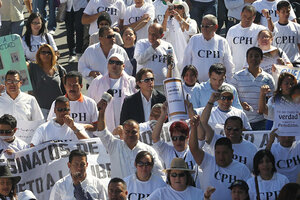Dim forecast for security in Honduras in 2012
Despite Honduran efforts to promote police reform and check organized crime, the country has become a major transit point for cocaine, and the future of its democratic institutions looks bleak.

Journalists demonstrate during a protest against the murders of their counterparts outside the Presidential house in Tegucigalpa, Honduras, December 9, 2011. 17 journalists have been shot dead in Honduras since 2010, making the small Central American nation one of the world's most dangerous places for reporters, according human rights groups.
Danny Ramirez/Reuters
Every New Year’s Eve, many Hondurans publicly burn “año viejo” figures made of papier maché and cardboard, which are commonly made to look like the evils of the past year. In an indication of just how much the population has been affected by the recent surge in crime, El Heraldo reports that this past Dec. 31 saw an unusually large number of organized crime-related figures being burned in the streets of Tegucigalpa. Because “año viejo” figures are often meant to convey some kind of commentary on current events, many of them resembled police officers, a reflection of the widespread corruption within the Honduran police force.
Unfortunately, this symbolic act was tempered by another, equally revealing sign of Honduras’s deteriorating democracy. According to La Prensa, several of these figures were confiscated by police before they could be set ablaze. Despite a call by the director of the National Police for officers to respect citizens’ right to free speech, many seized año viejo figures they deemed particularly offensive, telling their creators that they were an affront to the police force as an institution.
Such incidents are perfectly in keeping with the reputation of Honduran police. In addition to having been accused of cooperating with drug trafficking organizations in some cases, the Honduran National police claim to have “lost” thousands of confiscated weapons, many of which have ended up on the black market.
In response to the widespread police corruption, President Porfirio Lobo has vowed to clean up the institution. In the meantime he has succeeded in convincing Congress to allow the military to take on policing responsibilities. But while the Honduran armed forces have a cleaner reputation than the police, they have baggage of their own. According to a US diplomatic cable leaked last spring by WikiLeaks, members of the military sold light anti-tank weapons to criminal organizations in Mexico and Colombia.
What’s more, it isn’t clear whether Lobo’s commitment to systematically rooting out corrupt police amounts to more than lip service. The Lobo administration framed the November arrest of 176 police officers on charges of connections to kidnapping plots and drug trafficking as part of a national crackdown on police corruption, when, in fact, they were all assigned to the same police station in Tegucigalpa. This is the station where police are suspected of having murdered two university students, meaning that their arrest was likely more related to the case than part of a nationwide purge of the country’s 11,000 police officers.
Meanwhile, transnational drug trafficking organizations have taken advantage of the apparent weakness of the Honduran state to transform it into a primary transit point for US-bound cocaine. In September, Defense Minister Marlon Pascua told local press that 87 percent of cocaine which is sent from South America to the United States passes through Honduras. As InSight Crime has reported, applying this percentage to the United Nations’ latest estimates of the size of the US cocaine market suggests that an incredible 143.55 tons of the drug pass through Honduras annually. A recent Washington Post investigation, citing unidentified US government sources, puts the figure even higher, at 25 to 30 tons of cocaine per month, or between 300 and 360 tons annually. According to an anonymous US official working in Honduras, the Central American nation has become “by far the world’s largest primary transshipment point for cocaine.”
This flow of drugs has been accompanied by a surge in killings. The number of homicides has more than doubled since 2005, and the UN Global Study on Homicide put the country’s homicide rate at 82.1 per 100,000, the highest in the world.
To make matters worse, the vice president of the Honduran Congress, Marvin Ponce, recently claimed to have evidence that powerful sectors of Honduran society could be plotting to overthrow the government of President Porfirio Lobo, just as President Zelaya was ousted in 2009. Ponce told El Tiempo last week that these unnamed interests seek to take advantage of insecurity generated by Lobo’s recent efforts to clean up the country’s police force, and using the situation to weaken Lobo politically. "These groups want to make use of the police crisis and are linked to a section of the Armed Forces, which they could use to cause a coup," said Ponce.
It is worth remembering that this is not the first time that rumors of a coup against Lobo have surfaced. In September 2010, just eight months after taking office, Lobo warned that his critics were planning to overthrow him because of his efforts at reconciliation with the pro-Zelaya camp, though he later scaled this back, saying that carrying out another coup would be like “reaching Pluto.”
Because of the public and international outcry after the coup, it’s likely that it has become a trigger issue for politicians hoping to attract attention. That being said, at the very least the allegations show the weakness of the country’s democracy. This, along with the deep-rooted state of organized criminal activity, suggests that 2012 will be a difficult year for Honduras.
--- Geoffrey Ramsey is a writer for Insight – Organized Crime in the Americas, which provides research, analysis, and investigation of the criminal world throughout the region. Find all of his research here.

